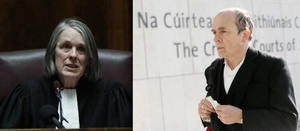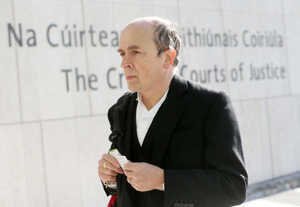Chief Justice Susan Denham (left) and Patrick Gageby SC
Earlier this year we highlighted the unusual circumstances surrounding the Supreme Court decision that allowed suspected paedophile swimming coach Geoge Gibney to escape justice.
The decision in November 1994 granted Mr Gibney leave to apply for judicial review on the basis that his right to a fair trial was infringed because of a delay in reporting the alleged offences.
This was the first case in Ireland to recognise that a delay in making a complaint of sexual abuse could preclude a subsequent prosecution.
What also marked out this case was that Patrick Gageby, one of Mr Gibney’s barristers, appeared before his own sister, Susan Denham, who was on the Supreme Court that day.
And court records show this hearing was not the only case in which Mr Gageby has appeared before his sister.
It was one of many.
In 1991 Susan Denham was appointed a High Court judge and a year later was appointed to the Supreme Court. Thomas Finlay was Chief Justice at the time and had responsibility for assigning judges to cases.
Ms Denham subsequently sat as a judge on at least two cases in which Patrick Gageby appeared as a Junior Counsel.
G v DPP [1994] 1 IR 374
People v Rock [1994] 1 ILRM 66
Mr Gageby became a senior counsel in 1995 and the practice continued under successive Chief Justices.
1994: Liam Hamilton appointed Chief Justice.
Larkin v O’Dea [1995] 2 IR 485
Incorporated Law Society of Ireland v Carroll [1995] 3 IR 145
O’Leary v A-G [1995] 1 IR 254
DPP v PG [1996] 1 IR 281
DPP v McDonagh [1996] 1 IR 565
DPP v McGinley 1998 WJSC 5791
POC v DPP [2000] 3 IR 87
2000: Ronan Keane appointed Chief Justice.
DPP v Edgeworth [2001] 2 IR
FMcK v AF [2002] 2 ILRM 203
2004: John Murray appointed Chief Justice.
O’Brien v DPP [2005] 2 ILRM 444
Gilligan v DPP [2006] 2 IR 389
Carmody v Minister for Justice [2010] 1 IR 635
These cases represent a relatively small fraction of Mr Gageby’s busy criminal practice during this period. However they involved key issues of constitutional and criminal law.
The number of judges on the Supreme Court has increased over the last few years, but there would always have been enough judges to avoid Ms Denham having to deal with cases involving her brother.
In July 2011 Susan Denham was appointed Chief Justice and the practice appears to have ceased.
Irish law is subject to general rules of fair procedure, including the principle ‘nemo iudex in causa sua‘ (no man shall be a judge in his own cause), which provides for the quashing of judicial decisions made in ‘circumstances which would lead a fair-minded and informed observer to conclude that there was a real possibility … that the tribunal was biased’.
Last year, the Supreme Court quashed a decision of a High Court judge who had held shares in one of the companies party to the litigation in circumstances where he had mistakenly failed to disclose the full extent of that shareholding.
In this instance Susan Denham, now Chief Justice, gave the majority verdict.
Ms Denham said objective bias was a matter not just for the parties, or the trial judge, but brought in issues regarding:
“…the fundamental concern for the manifest impartial administration of justice and the confidence which the people rest in the judiciary.”
Previously: The Chief Justice, Her Brother And How George Gibney Got Away





being related to the defendant is not the same as being related to the Counsel. There are a lot of things wrong with the case but this is not one of them unless there is some sort of evidence.
“being related to the defendant is not the same as being related to the Counsel”
No sh*t Sherlock.
Being related to the defendant’s Counsel does not make for impartial administration of justice to most peoples’ minds I would think..
I’m not convinced. I see what you’re saying and I can see *why* you’re saying it. The fact is though that if Gageby wants/wanted to forge a career for himself as being any ‘good’ he has to be able to cut the mustard in any court, not just one where his sister presides.
In other words, if you were instructing a barrister, you’d pick somebody who was good 100% of the time (or at least a high proportion of the time) rather than somebody who might be crap but gets an easy ride in a small percentage of cases where his sister is on the bench.
testing
You need to look at this post from the perspective of the administration of justice as a whole the issue is not solely whether other barristers unfairly disadvantaged!!
Tis working..nevermind.
The issue is not how good a counsel Patrick Gageby is..he has very good track record in representing paedophiles.
The issue is that of impartiality..as Susan Denham explains herself in relation to another case.
My point is that an allegation is being made of bias; Gageby appears in front of Denham -> verdict goes his way. I’m saying that it’s not a particularly good route to a successful career as a barrister if you’re only good if there’s a family member on the bench and that maybe – just maybe – he’s quite competent.
Is this allegation of bias (and I’m focussing on Denham/Gageby) coming from anywhere apart from Bodger?
Ivan, would you ever read the post again and in particular Denham’s comments on perceived bias.
Perceived.
I don’t think Bodger is going as far as alleging actual bias, merely that Denham though alive to perceived bias in other contexts appears blind to the perception of bias in relation to a family member appearing regularly before her (tho even the Bar Council, not known for worrying too much about how it appears to the public, has indicated that the practice of family members appearing as Counsel regularly before a particular judge is not something it endorses, see Broadsheet’s previous post on this issue.
“I’m saying that it’s not a particularly good route to a successful career as a barrister if you’re only good if there’s a family member on the bench and that maybe – just maybe – he’s quite competent.”
His competency is not the issue. It’s the ‘impartial administration of justice’, as stated by Susan Denham.
I’ve looked at the Bar Council rules; they certainly don’t endorse it and say that “The opposing party should always be notified when this situation arises in case they wish to raise an objection. Every effort should be made to facilitate an objection on these grounds.” It occurs to me – and i’m only playing devils advocate – that it’s highly unlikely that opposing counsel wouldn’t be aware of the situation.
And as Alison says above – the maxim of “nemo iudex in causa sua” means that if Tom and Jerry have a fight, that Tom can’t be the judge of it. Or Jerry.
So the maxim isn’t being breached, and the opposition can cry foul in any proceedings where this alleged bias *might* happen.
Ivan, do you realistically think an opposing counsel is going to suggest even perceived bias on the part of a member of the Supreme Court?
Or even make a complaint to the Bar Council, about the sibling of a member of the Court?
Be realistic here.
As for a notification requirement being a panacea…. There are many many reasons why the perceived bias was not pointed out, but lack of knowledge of the fact Gageby was Denham’s brother was not one of them!
The fact of the matter is, as far as the Gageby-Denhams are concerned, bias is something other people have to worry about, not them.
well why then do bar council rules say a barrister may not habitually appear before a member of his family
for alison
The *number of judges…, not the “amount” of judges…
Thanks Malta, fixed now. Sorry
Unless you’re buying judges by the kilo.
I think she meant everyone else, except her and her brother..
R v Sussex Justices, Ex parte McCarthy ([1924] 1 KB 256, [1923] All ER Rep 233) “Not only must Justice be done; it must also be seen to be done.”
She should have recused herself and not heard any case her brother was involved in. In the UK Supreme Court guide to judicial conduct:
3.9 A Justice will not sit in a case where:
he or she has a close family relationship with a party or with the spouse or domestic partner of a partner;
his or her spouse or domestic partner was a judge in a court below;
he or she has a close family relationship with an advocate appearing before the Supreme Court.
Why was this matter not raised at the time by the Bar Council, given what has emerged, is it not time that the Chief Justice considered her position, this issue has come into the public domain on several occasions, and has so far being met with stiff upper lip stone faced silence.
It’s only a matter for the Proles. Those with money and influence don’t go to jail unless they betray their class. So an unfair trial for them only means a longer suspended sentence.
My brother was my lecturer for one module in my first year in University. I had to sit a different exam to the other students at the end of the year.
I believe the reason was not that I and my brother would cheat , it was to protect my brother and myself against even the suspicion of impropriety. The other students in the class were made aware of the situation.
but I suppose thats different . education is serious…
Corruption lives at the centre of every instruction in this state.
Perhaps Gibney Denham and Gageby were in the same “swimming” club together
There are many rotten things at the core of this corrupt little country. At the heart of it is our legal system.